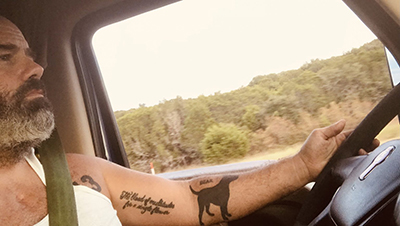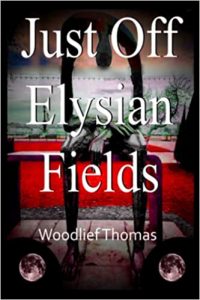 Little Rock native’s novel influenced
by his experiences of New Orleans
Little Rock native’s novel influenced
by his experiences of New Orleans
CONWAY, Arkansas (November 14, 2022)—The 2022 novel Just Off Elysian
Fields (Del Sol Press) is the work of Hendrix alumnus Woodlief Thomas
’96, whose travels, teaching, freelance writing, and study of sociology during
his time at Hendrix helped lay the foundation for his first work of fiction.
The tale is told by several residents of post-Katrina New Orleans, a city
Thomas experienced first through a three-year Teach for America assignment,
then by extending his teaching career there for more than a decade.
Thomas, a Little Rock native who
moved back to his hometown before completing Just
Off Elysian Fields, spoke recently with Amy Forbus ’96 of the
Hendrix Office of Communications. Excerpts from that conversation follow.
When you were Hendrix student,
what did you think you wanted to do as a career?
Well, it definitely didn’t have
anything to do with writing. And it didn’t really even have anything to do with
teaching, either. I was just studying sociology and thinking about social work.
 I applied to Teach for America
because I didn’t really know exactly what direction I wanted to take, and after
three years doing that, I applied to some MSW programs and was all set up with
one, but I was traveling that summer and I realized that I wanted to just keep
traveling for as long as I could. So instead of social work or teaching, I did
odd jobs, like working on a fishing boat in Alaska, so I could keep on rambling
a bit longer and see more of the world. I knew I wanted to help folks in some
form or fashion, but I still didn’t know how I wanted to go about it.
I applied to Teach for America
because I didn’t really know exactly what direction I wanted to take, and after
three years doing that, I applied to some MSW programs and was all set up with
one, but I was traveling that summer and I realized that I wanted to just keep
traveling for as long as I could. So instead of social work or teaching, I did
odd jobs, like working on a fishing boat in Alaska, so I could keep on rambling
a bit longer and see more of the world. I knew I wanted to help folks in some
form or fashion, but I still didn’t know how I wanted to go about it.
And then you took the teaching
turn?
And what a turn it was. It ended up
being like 16 years.
Did teaching lead you toward
writing?
I would say that traveling led me
towards writing more than anything. When I came to Hendrix, I wasn’t a reader
of fiction. But after college, I spent time on buses and all these different
modes of transport that are really slow, taking whatever cost less. And I spent
a lot of that time reading.
While I was traveling, my reading and
writing took off, aided by my sociological education at Hendrix. I was
examining the world, trying to figure out “What’s going on here that’s not
going on in the States?” It opened up new ways of seeing for me and I wanted to
write about it all.
Was there a particular point when
you thought, “I’m going to write a novel”?
Oh yeah, definitely. I was writing nonfiction;
all my first publications are essays, some of them about travels and a lot more
about New Orleans. But I found myself realizing that writing nonfiction frequently
put me in ambiguous ethical positions. I felt pressured to make changes to create
a “better” story. Problem was, I take the non- in non-fiction very seriously,
and I would sometimes be asked to put in information that contradicted my own
experience in order to develop tension. Like let’s say I’m writing about Cambodia and
they want me to talk about how dangerous it is, throw in some info about
poisonous snakes and homicide rates and political violence and whatnot, but
while there I didn’t once feel endangered, and in that piece I’m trying to
write about something else altogether. Experiences like that made me stray
away from nonfiction.
When I first moved back to New
Orleans after Hurricane Katrina, I was living on Dauphine Street, and I found
these interesting people living around me. In the book, the character Antoine
lives on Dauphine in the same building I lived in. Maybelle, another character,
lives on Governor Nicholls Street, in the house where I lived the longest when
I was in New Orleans. Human behavior in New Orleans is different from anywhere
else. Ultimately, I decided that nonfiction couldn’t fully capture the world
around me there.
New Orleans is such an outdoor-centric place. So much of the life there occurs outside; watching everything pass by
and the rhythm of my neighborhood, the Sixth Ward… the things I saw, some of
them were very dark and violent, but more often beautiful and wonderful. So
many things I saw there stretched my mind… New Orleans stretches the
understanding of what is real. There is that mystical element in Just Off
Elysian Fields.
To me, the book echoes a lot of
Southern fiction: the shifting narrative perspectives, the thread of
desperation that runs through the characters.
Yeah, it is definitely, distinctly
Southern, partly because the South is where I’ve lived the majority of my life,
and also another element: The book is violent, and the South is a violent place.
New Orleans is terribly Southern. But it’s also very, very American, and very
Caribbean, in many ways it’s everything, and that’s what a lot of the story’s
about. It’s everybody’s in-between, including the ghosts in the book—back when
I lived there I would not have been surprised in the slightest if a ghost had
just walked down Governor Nicholls and sat down with me on my stoop and shared
some wine—and that’s where the shifting perspectives come in. There are so many
different wild perspectives that converge, and that’s why I think third person
[narration] wouldn’t really work well.
In the acknowledgments, you
mention retired Hendrix sociology professors Stella Čapek and Jim Bruce. How
did their influence shape the novel?
They opened my eyes to the idea of
structural violence—violence that occurs every day, walking down your block. It
doesn’t necessarily involve blood, maybe not even tears, it’s just structures
in society that create conditions that make it very difficult for people to
thrive, and also to be themselves, which is a huge part of what Just Off
Elysian Fields is about. The protagonist, for instance, just trying to
remember pre-trauma, multiple traumas, who really is he, because all
these terrible things that have happened have calcified him into this one
understanding of himself, which is not really where he started. It’s obvious he
has been run down by the things that can bruise a person, these structures that
crush people, but it’s not obvious that it’s happening.
Right. It’s not flagrant.
Exactly. Like violence to the spirit,
as opposed to the body (though that obviously happens as well). These
characters are looking through the veil of civilization, in particular American
civilization, a hyper-capitalist civilization—looking through that and seeing
how many of the structures keep that system going to crush people up.
A recent social media meme reads,
“Don’t judge people
for the choices they make when you don’t know the options they had to choose
from.” I thought of Antoine and some of your other characters.
Yeah, that’s accurate. [The
characters] are offered very few avenues towards prosperity. Teaching all those
years, and living in my students’ neighborhoods, I saw some of the conditions
that a lot of my students and students’ families were living in and the inner
turmoil that these conditions create. It’s not documented a great deal; that’s
why I think it slips underneath the consciousness of many people. What I took
from Čapek and Bruce was a deeper analysis of the institutions that create
structural violence and what it can do to people.
With all the pressures in life that
crush people, we can forget all the beautiful things that we’re made of. So I
imagined Antoine scraping himself together and doing something really beautiful
and heroic.
I wanted to do social work or
something like it to address that kind of violence, and I guess I’ve done it,
but in different ways. Teaching and writing, for example.
Now that this novel’s published,
are you pleased with it?
Yeah, but the publisher was clear
that I should not expect a great deal from a book of literary fiction. It’s
hard for this type of story to be financially successful. I mean, it’s
definitely not James Patterson-type stuff.
Not every novelist can be a James
Patterson, from the financial perspective.
Without a doubt. And I know a lot of
people find this novel relatively grim, which I don’t. I feel like it’s more
authentic than my experience with nonfiction. Sometimes when I was doing the
revision, I’d hear back from my editor, suggesting I change something that I
didn’t really feel comfortable changing.
I could write things that are less
bleak, more sunny stuff, whatever. But that’s not really what I’m worried
about. It took 15 years to write this book and get it out into the world, and it’s true to its original concept.
I’m happy about that.
And you’ve been doing long-haul
truck driving along with writing in recent years, right?
Yeah, it seems antithetical to the
writing life, but it actually helps me have more control over my schedule. I
can do it for a while and then take time off. When I’m home, I’m home—with my family and my writing. And there’s time to think out on the road.
Maybe someday all that thinking will coalesce into a self-help book or
something like that [laughs].